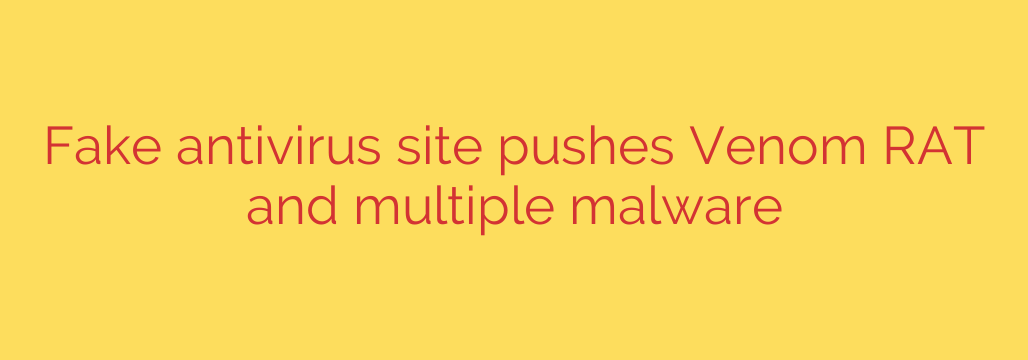
Understanding the Threat: Fake Security Websites Distribute Dangerous Malware
Cybercriminals are constantly evolving their tactics to trick unsuspecting users. A particularly dangerous method involves setting up websites that look like legitimate security software providers but are actually designed to distribute malware. These sites often promise virus scans or free security tools to lure visitors looking for protection.
Recent reports highlight cases where such deceptive websites are pushing sophisticated threats like the Venom RAT (Remote Access Trojan), among other types of malicious software. When users visit these fake sites and click on download links, thinking they are getting protection, they are instead downloading harmful programs directly onto their computers.
The Venom RAT is a powerful type of Trojan that allows attackers to gain extensive control over an infected computer remotely. Once installed, it can perform various malicious activities without the user’s knowledge. This includes monitoring user activity, stealing sensitive data such as passwords, credit card details, and other personal information, taking screenshots, and recording keystrokes. It can also be used to download and execute further malware or manipulate files on the compromised system.
Besides the Venom RAT, these fake security downloads can also bundle other harmful programs, significantly increasing the risk to the user. This could include information stealers, which are specifically designed to harvest personal and financial data for fraudulent purposes, or other forms of Trojans and viruses that can damage systems, create backdoors, or facilitate further attacks by cybercriminals.
The creators of these fake sites use various techniques to make them appear convincing and trustworthy. They might copy the look and feel of real, reputable antivirus software websites, use urgent language to pressure users into immediate downloads, or employ malicious advertising techniques to drive unsuspecting traffic to their fraudulent pages. They aim to exploit user fear and trust in security software to spread their harmful programs.
Protecting yourself requires vigilance and careful online habits. Always be extremely cautious when downloading software, especially security tools, from unfamiliar or questionable websites. It is crucial to only download software directly from the official websites of well-known and trusted security vendors or from official application stores. Pay close attention to website addresses to ensure they are legitimate and watch out for potential red flags such as poor grammar, unprofessional design, or suspicious requests for information.
Using a reputable, up-to-date antivirus or anti-malware program on your computer is also an essential layer of defense. This can help detect and block malicious downloads and files before they have a chance to infect your system. Regularly updating your operating system and other software is equally important, as these updates often patch known security vulnerabilities that malware might otherwise exploit to gain access.
In summary, the threat from fake security websites distributing dangerous malware like Venom RAT is a serious concern in the current digital landscape. Staying informed about these tactics and consistently practicing safe browsing and downloading habits are your best defenses against falling victim to these sophisticated attacks and protecting your personal data and devices.
Source: https://securityaffairs.com/178366/malware/fake-antivirus-spreads-venom-rat.html








